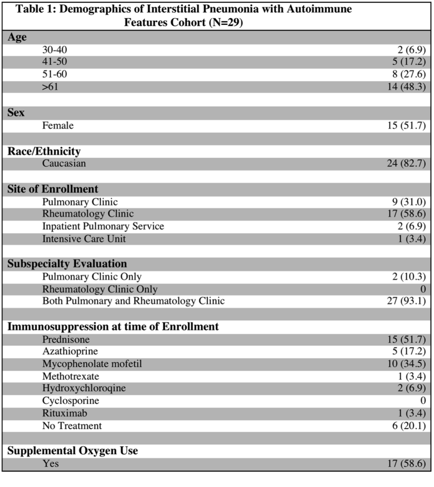Session Information
Date: Monday, October 22, 2018
Session Type: ACR Poster Session B
Session Time: 9:00AM-11:00AM
Background/Purpose: Interstitial Lung Disease (ILD) remains a significant diagnostic and therapeutic challenge, especially for patients who do not meet criteria for a connective tissue disease (CTD) or idiopathic pulmonary fibrosis. In 2015, the ATS/ERS developed the classification criteria for Interstitial Pneumonia with Autoimmune Features (IPAF) to describe individuals with features of autoimmunity who do not meet classification criteria for a CTD. It is unknown whether these criteria identify patients who could benefit from immunosuppressive therapies, we aim to evaluate this in a prospective cohort of patients.
Methods: IRB approval for the MYSTIC cohort was obtained in 9/2017. Patients were identified in the Vanderbilt University pulmonary and rheumatology clinics; inpatients were referred by their treating providers. Clinical phenotyping was performed by chart abstraction, and biospecimens were banked for future study. Additional data on pulmonary outcomes (radiographic studies, pulmonary function tests, echocardiograms, 6 minute walk test, supplemental oxygen use) will be collected at 6 month intervals.
Results: 29 patients meeting IPAF criteria were enrolled. The median age was 60, and 51.7% were female. 93% were evaluated by both pulmonologists and rheumatologists (table 1). Clinical criteria were present in 55.2%, serologic criteria in 100%, and morphologic criteria in 96.6% (table 2). The most common clinical features were Raynaud’s phenomenon, inflammatory arthritis, and mechanic’s hands. The vast majority of patients had a high resolution CT scan read as NSIP or “inconsistent with UIP”; only 3.4% had an HRCT scan consistent with UIP. 37.9% had an isolated positive ANA or rheumatoid factor, while 27.6% had anti-synthetase or anti-PM/Scl antibody.
Conclusion: IPAF undoubtedly encompasses a heterogeneous group of patients. Our cohort contains much less UIP than prior reports and has many patients with myositis associated antibodies. Additional work is needed to ascertain if (1) patients with myositis associated antibodies behave differently from patients with non-specific serologies and (2) whether these criteria identify patients who benefit from immunosuppression.

To cite this abstract in AMA style:
Schroeder G, Barnado A, Annapureddy N, Dudenhofer R, Crofford L, Wilfong E. A Multidisciplinary Cohort of Patients with Interstitial Pneumonia with Autoimmune Features [abstract]. Arthritis Rheumatol. 2018; 70 (suppl 9). https://acrabstracts.org/abstract/a-multidisciplinary-cohort-of-patients-with-interstitial-pneumonia-with-autoimmune-features/. Accessed .« Back to 2018 ACR/ARHP Annual Meeting
ACR Meeting Abstracts - https://acrabstracts.org/abstract/a-multidisciplinary-cohort-of-patients-with-interstitial-pneumonia-with-autoimmune-features/
